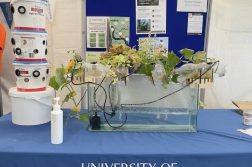The Coronavirus outbreak has dominated the news for the past few weeks, with horror stories on how long it will go on for and new symptoms to be wary of. But what is our university doing to tackle it? The University of Southampton is a Russell Group institution, meaning research is a key part of how we are taught. As the Prime Minister has made clear, scientific research is a key part of fighting the virus both now and in the future.
Whilst you may hear of current high-profile studies into drugs, PPE and testing kits for Covid-19 around the world, it is easy to forget that some of it is a lot closer to home than you may think. As a globally recognised leader in respiratory medicine and microbial science, we at UoS clearly have the skills, knowledge and tools to contribute.
Dr Max Crispin, of the School of Biological Sciences, is leading research on sugars bound to the spikes seen on the surface of the virus: this is called the glycosylation pattern. The ‘crown’ of spikes on the surface of the coronavirus are needed to allow its entry into cells and subsequent fusion to the membrane; the sugars (glycans) ‘coat’ the virus and allow it to evade our immune system through a molecular disguise described as ‘like a wolf in sheep’s clothing‘ by Dr Crispin. This is what allows the coronavirus to ‘hide’ within our cells and from there cause further damage.
Using site-specific mass spectrometry, Dr Crispin’s lab mapped the structure and location of these glycans; this tells us which parts of the viral proteins are available as potential targets for a Covid-19 vaccine. One key finding so far is that, in comparison to other viruses, Covid-19 has a low glycan density i.e. the viral antigens are more accessible. Not only does this mean our immune system can more quickly recognise and neutralise the virus, but these results can also be used to identify viral antigens for consideration as potential vaccine candidates. To read more about Dr Crispin’s research please click here for the full paper.
A recent Biological Sciences PhD graduate is also heavily involved in the development of faster and more efficient testing techniques for Covid-19. Dr Connor Maltby completed his doctorate in Molecular Neuroscience last year and currently is working in a team of volunteer researchers developing new assays to detect Covid-19 at Basingstoke & North Hampshire Hospital. Previous testing methods were complex and time consuming, which limited the hospital’s testing capacity. In response, Dr Maltby and his team developed a new rapid assay termed RT-LAMP (Reverse Transcription Loop mediated isothermal AMPlification). Simply put, this new technique can detect strong results in as little as 5 minutes and weak results in roughly 20 minutes; because of its speed, Public Health England plans to introduce the assay to all NHS and PHE testing labs over the country.
As well as the School of Biological Sciences, the Faculty of Medicine are also working to find treatments for the virus. Professor Tom Wilkinson is leading a trial, initially at Southampton General Hospital and later at ten other NHS facilities, to test whether an inhaled drug can prevent the worsening of Covid-19 in vulnerable patients. The drug, called SNG001, contains a version of a natural antiviral protein found in the immune system called interferon beta 1a (IFN-β). This protein is produced during viral lung infections and works to directly kill the virus, activating immune cells and triggering the expansion of these cells specific to the virus. SNG001 functions by delivering extra IFN-β to the lungs to strengthen the immune response; this is especially important for people suffering with chronic diseases as they will have reduced interferon levels. SNG001 was previously tested in clinical trials on asthma patients and has shown to be well tolerated, while improving patients’ response to viral lung infections; this offers encouraging results for treating Covid-19.
Researchers at our university have been doing amazing work contributing to preventative measures and treatment for COVID-19 in the future; but you don’t necessarily need a PhD to help. The university set up the Southampton Coronavirus Response Fund on April 3rd and have received over £180,000 of donations (as of the 13th April). This has come from over 830 staff, students and members of the public who have raised funding for the vital research that scientists at Southampton are working on, and to better protect people working on the front lines of healthcare. Whilst the university is actively working to solve the coronavirus problem, it’s easy to see how everyone has the potential to contribute and help. If you’d like to find out more about the Southampton Coronavirus Response Fund and the research it is supporting, please click here.



